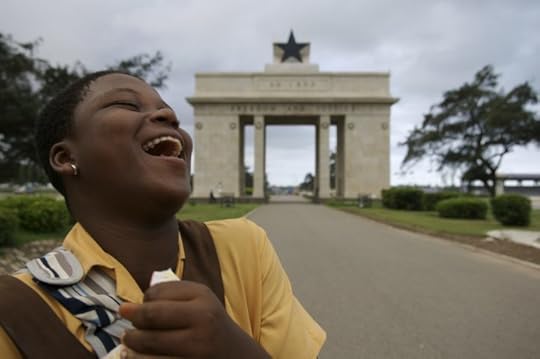What is the Dangbe word for chameleon?

Accra, Ghana 2006. Image credit Jonathan Ernst via World Bank Flickr (CC).
A few weeks ago,��I asked my mother for the��Dangbe��language translation��of��the English word�����chameleon.�����She couldn���t remember it. She insisted that she knew it but hadn���t used it in a long time,��deferring rather to the English word. So, my mother called her sister who unsurprisingly didn���t remember either. They called another aunt who,��they assured me,��spoke proper��Dangbe. Strangely, she used the Twi equivalent of�������bosomaketew,�����convinced that was the��Dangbe��word.��The search continued.��Friends were called, pocket dictionaries were consulted and memories were racked�����till the word�����Akpasi�����was found.��The entire exchange was hilarious but filled me with a profound sadness. Although my family speaks��Dangbe, I was raised with the Ga language because I grew up in towns where Ga is the native language.��Dangbe��is increasingly becoming endangered, losing��ground as a first language and I am an example of this.
In Ghana,��speaking a local language in school is subject to punishment��as in��other African countries. This is a bizarre attitude seeing as Ghanaian languages are examinable subjects in the school curriculum. The law requires that��a local language is used as the language of instruction��from kindergarten to upper primary level. From then on, English replaces these languages as the language of instruction.��Given��the favored outlook towards English,��this law is often non-enforced,��with English being used throughout��a child���s early schooling.��We could argue about the effectiveness and usefulness of this law. In a��globalized��era,��in which��competency in English is highly valued,��we could argue that��English as a language of instruction from the beginning of formal education is useful.
I���m more interested in the��impression that such a law gives about the relationship between English and the other languages. It assumes that local languages exist merely as launching pads into a higher form of education in English. After the fourth grade, they are reduced to single non-compulsory subjects, pushed aside for the favored English. Coupled with attitudes of derision and negativity, local languages are then increasingly seen as lesser.��Native fluency��is on the��decline in most mother tongues.��What is occurring in its place is switching and mixing with English��to supplement vocabulary.��English becomes the default base for discussing serious and complex issues with insertions from other languages. English vocabulary is�����localized�����and the indigenous equivalents of these words steadily decline in use.
UNESCO marks 2019 as the��International Year of Indigenous languages. This creates a timely awareness about the declining use of��indigenous languages in��Ghana and other African countries. It is time to reflect on��our cultural existence. Languages are a form of communication��that��enable us to speak and to understand each other, eliminating conflict and misunderstanding. Yet,��languages are more than a simple, practical tool for communication.��They are��also about culture. We��are��our languages because we think and exist��in��them. Our uniqueness as Ghanaians lays in our understanding of the world created and constructed through our languages. It is as simple as�����omo��shishi�����(the��bottom part of cooked rice) being a concept we understand and something others don���t.��Now more than ever, Fanon���s��diagnosis��in��Black Skin, White Masks��that,�����a man who has a language consequently possesses the world expressed and implied by that language�����remains timely. Even��as��English connects us at the global and the national level, there is the need to promote and preserve our languages. After all, who are we without��them?
English is not the only danger towards the loss of the use of Ghanaian languages. The reality is that Twi does serve as a de facto lingua franca in the nation, an unsurprising fact considering that��Akan forms the largest language group. It is not uncommon to be addressed first in Twi when recognized as a fellow Ghanaian.�����If you are a Ghanaian, you must speak Twi,�����has become a mantra that seeks to normalize this phenomenon.��Yet, to be Ghanaian is not synonymous to speaking Twi. To be Ghanaian is to belong to��any��of the��81 languages��in the country.��The��deference to Akan and specifically to Twi is��to the��detriment of other languages. The danger here lies in young generations viewing their own languages as unimportant, and thus, relegated less audible.��In Tanzania,��for example,��Swahili as the national and official language challenges the��place of English��and simultaneously relegates other languages solely to the private sphere,��while deeply influencing speech patterns.����As a multilingual country that prides itself on a multitude of cultures, the preference and upholding of one or two languages is a contradiction to the basis of the nation.
Languages must be promoted as��living day-to-day��materials��and not as archived materials in a museum.��There must be��books in local languages at all levels��and in��novels, short stories and poetry,��not only books written as part of the teaching curriculum in schools and religious texts.��There must be��easy access to reference books,��such as encyclopedias and dictionaries��both as physical texts and as digital products.
To date, there exist very few projects in this regard, but, for��instance,��a series of events rolled out this year by��The Bureau of Ghana Languages,��seeking��to promote the use of local languages,��and��The��Abena��Korantemaa��Oral History Prize,��a literary prize that��promotes��oral��narratives in��all Ghanaian languages.��Recently, a new writing prize called the��Ghanaian Languages Short Story Prize��was launched to award writers of short stories in selected Ghanaian languages.��Such efforts and others must be sustained in order��to promote the use of local languages and their cultures.��It rests on parents to teach their children their mother tongues and for the youth to achieve fluency in them to ensure that our languages are not endangered��and lost to us.��Without these languages, we risk��the language of forgetting��vital aspects of our national culture.
Sean Jacobs's Blog
- Sean Jacobs's profile
- 4 followers



